Posts Tagged ‘Transnational Institute’ (24 found)
Land Policies and Laws Must Reflect Rights and Interests of Vulnerable Communities
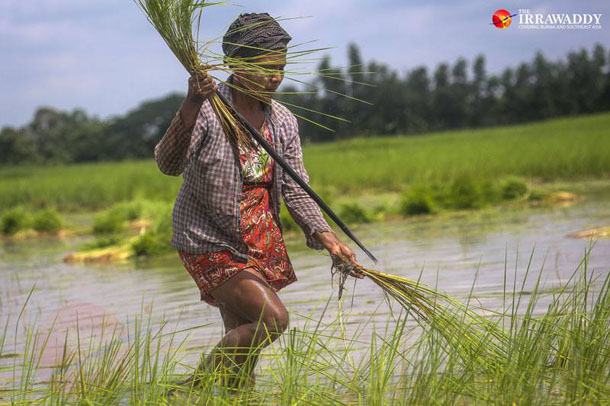 Amid the various serious issues currently dominating the headlines about Burma – including the upcoming elections, the escalation in fighting between the Burma Army and ethnic armies, the recent crackdown on workers’ protests, this year’s student marches, and ongoing religious tensions – it is important that people do not lose sight of the land issue. Like other developing South-East Asian countries, Burma is grappling with the sticky and complex problems of land ownership, rights and use. As is often the case, it is the poor and marginalized communities who are most vulnerable to exploitation and human rights abuses, particularly small-scale farmers in Burma’s beleaguered ethnic regions.
Amid the various serious issues currently dominating the headlines about Burma – including the upcoming elections, the escalation in fighting between the Burma Army and ethnic armies, the recent crackdown on workers’ protests, this year’s student marches, and ongoing religious tensions – it is important that people do not lose sight of the land issue. Like other developing South-East Asian countries, Burma is grappling with the sticky and complex problems of land ownership, rights and use. As is often the case, it is the poor and marginalized communities who are most vulnerable to exploitation and human rights abuses, particularly small-scale farmers in Burma’s beleaguered ethnic regions.
This month Human Rights Foundation of Monland-Burma (HURFOM) released a report titled “Yearning to be Heard: Mon Farmers’ Continued Struggle for Acknowledgement and Protection of their Rights” – a follow-up to their 2013 report “Disputed Territory: Mon Farmers’ Fight Against Unjust Land Acquisition and Barriers to Their Progress.” It argues that “continuing barriers to progress lie primarily in the country’s broken land management system, the failures of recent land laws to secure the protection of farmers’ land rights, the failure of government bodies and authorities to perform their responsibilities unbiased from military influence, and the total impunity of the military due to the independent structure of the courts-martial.” A salient example of such impunity, mentioned in the report, is the confiscation of more than 2,000 acres of rubber plantation in Thanbyuzayat Township, Mon State, over the past year. Regrettably, such land rights abuses betray the paltry extent to which the Burma Government is able to influence the Burma Army and rein in its illegal activities […]
• • •Linking Women and Land in Myanmar: Recognising Gender in the National Land Use Policy
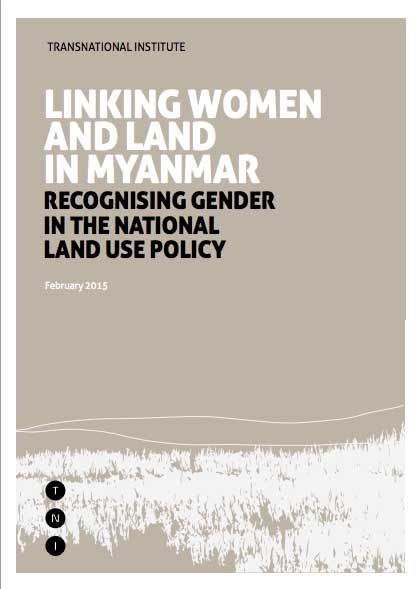 The draft National Land Use Policy (NLUP) that was unveiled for public comment in October 2014 intends to create a clear national framework for managing land in Myanmar1. This is a very important step for Myanmar, given the fundamental importance of land policy for any society – particularly those with recent and complex histories of political and armed conflict and protracted displaced populations. With 70% of Myanmar’s population living and working in rural areas, agriculture is a fundamental part of the country’s social and economic fabric. The majority of these are small-holder farmers, whose land rights are currently under threat. The situation is particularly dire for the country’s ethnic minority groups, who make up an estimated 30% of the population […]
The draft National Land Use Policy (NLUP) that was unveiled for public comment in October 2014 intends to create a clear national framework for managing land in Myanmar1. This is a very important step for Myanmar, given the fundamental importance of land policy for any society – particularly those with recent and complex histories of political and armed conflict and protracted displaced populations. With 70% of Myanmar’s population living and working in rural areas, agriculture is a fundamental part of the country’s social and economic fabric. The majority of these are small-holder farmers, whose land rights are currently under threat. The situation is particularly dire for the country’s ethnic minority groups, who make up an estimated 30% of the population […]
Transnational Institute: Towards a Healthier Legal Environment – A Review of Myanmar’s Drug Laws
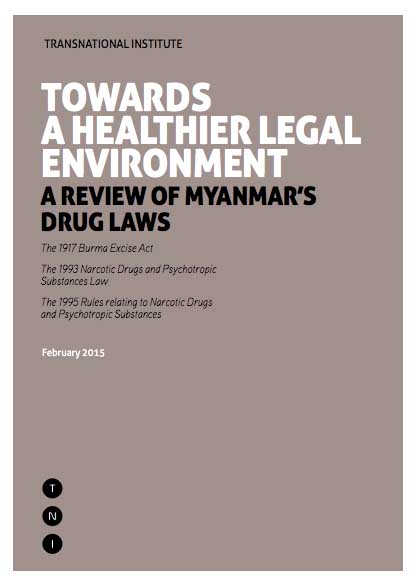 This report reviews Myanmar’s drug laws and related policies, including the 1917 Burma Excise Act; the 1993 Narcotic Drugs and Psychotropic Substances Law; and the 1995 Rules relating to Narcotic Drugs and Psychotropic Substances. Since these laws were enacted several important changes have taken place inside and outside of Myanmar […]
This report reviews Myanmar’s drug laws and related policies, including the 1917 Burma Excise Act; the 1993 Narcotic Drugs and Psychotropic Substances Law; and the 1995 Rules relating to Narcotic Drugs and Psychotropic Substances. Since these laws were enacted several important changes have taken place inside and outside of Myanmar […]
Transnational Institute: Towards a Healthier Legal Environment
Since the current drug laws were enacted several important changes have taken place inside and outside of Myanmar. The decision of the Myanmar Government to review the law is not only timely but also offers a prospect to improve the drugs legislation and to ensure that the laws address drug-related problems in the country Introduction […]
• • •The Challenge of Democratic and Inclusive Land Policymaking in Myanmar: A Response to the Draft National Land Use Policy
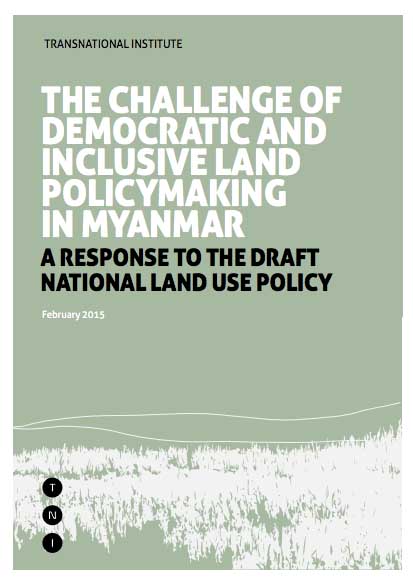 In October 2014 the Myanmar government unveiled a draft National Land Use Policy (NLUP) and announced it would take public comments for a limited time before finalizing the document. Once it is finalized, the new policy will determine the distribution, use and management of the country’s land and related natural resources like forests and rivers, for years to come […]
In October 2014 the Myanmar government unveiled a draft National Land Use Policy (NLUP) and announced it would take public comments for a limited time before finalizing the document. Once it is finalized, the new policy will determine the distribution, use and management of the country’s land and related natural resources like forests and rivers, for years to come […]
New National Land Use Policy Must Reflect the Concerns of those Affected
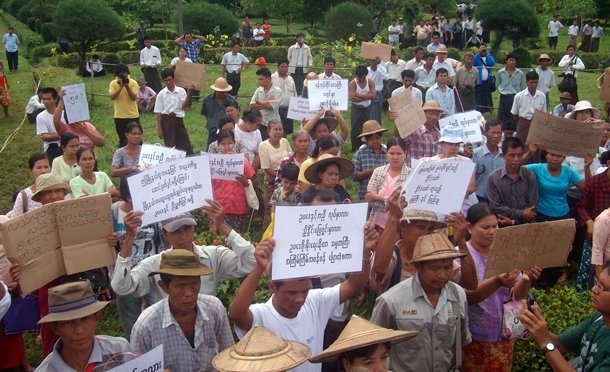 The Burma Government released its draft land use policy document and opened it up for consultations with the public. Despite this positive sign, the time for consultations is inadequate with no proper mechanism or space created for the meaningful participation of affected communities in order for their concerns to be reflected in the draft. The draft document itself has been heavily criticized for serving to further empower investors over small scale farmers.
The Burma Government released its draft land use policy document and opened it up for consultations with the public. Despite this positive sign, the time for consultations is inadequate with no proper mechanism or space created for the meaningful participation of affected communities in order for their concerns to be reflected in the draft. The draft document itself has been heavily criticized for serving to further empower investors over small scale farmers.
Since the beginning of the reform process in 2011, land grabbing, a practice that the previous military regime engaged in regularly, has hit new heights as a flurry of investors seek opportunities in previously untapped markets and the Burma Government liberalizes the economy. A prime example of this is the Dawei Special Economic Zone (SEZ) Project, a joint Thailand–Burma Government initiative that is seeking private investment to create one of the largest industrial zones in Asia. A report released by Dawei Development Association on 21 October 2014 highlights how 20-36 villages will be negatively affected. Concerns iterated by the local communities show that they have “lost farmlands and natural resources that are vital to their livelihoods, without prior information.” Furthermore “there was no meaningful consultation, and a deeply flawed compensation process.”
Land grabbing is often done with protection from the military, or by the military itself, for factories, infrastructure projects, mono-crop plantations, or military bases, and as with the Dawei SEZ case, usually without adequate or indeed, any compensation. It is a nationwide problem, both in ethnic areas, as documented by the Human Rights Foundation of Monland and Karen Human Rights Group, while in central Burma and delta areas, land grabbing is common place. Given that around 70% of the population of Burma is engaged in agriculture, and it is agricultural lands that are most often confiscated, it is one of the most pressing issues for Burma today […]
• • •Pro-Business or Pro-Poor?
 Making Sense of recently unveiled Draft National Land Use Policy
Making Sense of recently unveiled Draft National Land Use Policy
October 18, 2014 saw the official unveiling by the government of the Republic of the Union of Myanmar of its much-awaited draft national land use policy. Once it is finalized, the new policy will guide the establishment of a new overarching framework for the governance of tenure of land and related natural resources like forests for years to come. As such, it is of vital importance.
This preliminary assessment aims to shed light on the key aspects of the draft policy and its potential implications for the country’s majority rural working poor, especially its ethnic minority peoples, although they are not the only ones whose future prospects hinge on how this policy making process will unfold. […]
• • •Opium Cultivation Bounces Back: TNI Report Shows Dramatic Failure of ASEAN’s ‘Drug Free’ Strategy
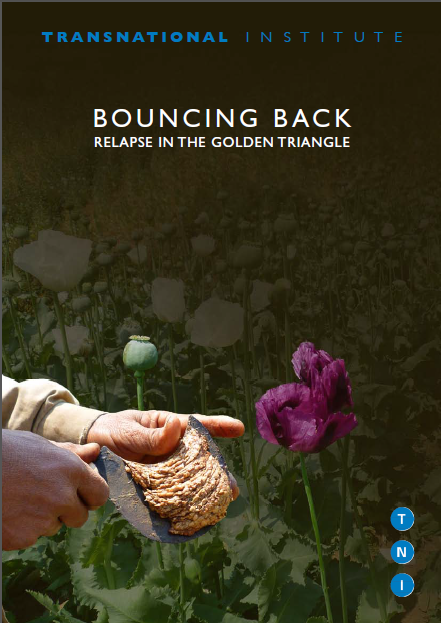 Bouncing Back – Relapse in the Golden Triangle, a new in-depth report by the Transnational Institute (TNI) launched in Yangon, Burma/Myanmar, on Monday June 2, highlights the profound changes in the illicit drugs market in the Golden Triangle – Burma, Thailand and Laos – and neighbouring India and China over the past five years. The report outlines the causes and consequences of a doubling of opium cultivation after a decade of decline. It argues that repressive drug control policies have failed to reduce consumption and production and instead led to more dangerous forms of drug use, growing human rights abuses and impoverishment. It finally highlights the workable alternatives that offer a better prospect for addressing drug-related problems in Southeast Asia. […]
Bouncing Back – Relapse in the Golden Triangle, a new in-depth report by the Transnational Institute (TNI) launched in Yangon, Burma/Myanmar, on Monday June 2, highlights the profound changes in the illicit drugs market in the Golden Triangle – Burma, Thailand and Laos – and neighbouring India and China over the past five years. The report outlines the causes and consequences of a doubling of opium cultivation after a decade of decline. It argues that repressive drug control policies have failed to reduce consumption and production and instead led to more dangerous forms of drug use, growing human rights abuses and impoverishment. It finally highlights the workable alternatives that offer a better prospect for addressing drug-related problems in Southeast Asia. […]
Ethnic Conflict in Burma/Myanmar: From Aspirations to Solutions
In November, TNI/BCN hosted a two-day seminar, involving ethnic groups from different regions of Burma, on the theme of “Ethnic Conflict in Burma/Myanmar: From Aspirations to Solutions”. Those participating included 20 representatives from Burmese civil society, political and armed opposition groups.
The seminar focused on four main areas: political reform; moving from ceasefires to political dialogue; land rights and natural resource extraction; and ethnic identity and citizenship […]
• • •Burma’s Ethnic Challenge: From Aspirations to Solutions
Important steps have been made in national reconciliation during the past two years. But promises and ceremonies will never be enough. The long-standing aspirations of Burma’s peoples for peace and justice must find solutions during the present time of national transition […]
• • •








 All posts
All posts